Here are some terms we will be using as we block and rehearse the play.
ACT1) Subdivision between sections of a play. A short play is a 'One-Act, a play with one interval has two Acts etc. Acts are subdivided further into Scenes.
ACTING AREA-That area within the performance space within which the actor may move in full view of the audience. Also known as the playing area This term is also used to describe the smaller subdivisions of the main stage area which are lit separately by the lighting designer (e.g. 'The stage is split into 6 acting areas, 3 downstage and 3 upstage'
AISLE - A passage through seating.
APRON - Section of the stage floor which projects towards or into the auditorium. In proscenium theatres, the part of the stage in front of the house tabs, or in front of the proscenium arch.
AUDITION - Process where the director or casting director of a production asks actors / actresses / performers to show him/her what they can do. Sometimes very nerve-wracking, but auditions can be a fairly painless process if handled properly. Performers are often asked to memorise a monologue from a play they like to perform for the director. Books full of suggested monologues are available. You may be asked to do a 'Cold Reading' which tests your own response to a piece of text you've not prepared.
AUDITORIUM - The part of the theatre accommodating the audience during the performance. Sometimes known as the 'house'. From the Latin Audio - 'I hear'.
BACKSTAGE - The part of the stage and theatre which is out of the sight of the audience. The service areas of the theatre.
BEGINNERS - A call given by Stage Management to bring those actors who appear in the first part of a play to the stage. e.g. 'Act One Beginners to the stage, please'. The actors/actresses are then called by name.A similar call is given after the interval
BLACK BOX - A kind of flexible studio theatre where the audience and actors are in the same room, surrounded by black tabs (curtains). Doesn't necessarily describe the audience layout, which can be easily reconfigured.
BLACKOUT / BO / B.O. - 1) Complete absence of stage lighting. Blue working lights backstage should remain on and are not usually under the control of the board, except during a Dead Blackout (DBO), when there is no onstage light. Exit signs and other emergency lighting must remain on at all times.2) The act of turning off (or fading out) stage lighting (e.g. 'This is where we go to blackout')
BLACKS - 1) Black clothing worn by stage management during productions. 2) Any black drapes or tabs, permanently or temporarily rigged. Used for masking technical areas.
BLOCKING - The process of arranging moves to be made by the actors during the play, recorded by stage management in the prompt script. Positions at the start of scenes are noted, as are all movements around the stage
BOX OFFICE - Part of the theatre front of house area where audience members can buy tickets. Most Box Offices are now computerised, and offer phone reservations. Some offer online (internet) bookings also.
BOX SET - Naturalistic setting of a complete room built from flats with only the side nearest the audience (the fourth wall) missing.
BREAK A LEG - A superstitious and widely accepted alternative to 'Good Luck' (which is considered bad luck).
CALL - 1) A notification of a working session (eg a Rehearsal Call) 2) The period of time to which the above call refers. (eg 'Your call for tomorrow nights show is 6.55pm') 3) A request for an actor to come to the stage because an entrance is imminent (these are courtesy calls and should not be relied on by actors 4) An acknowledgement of applause (eg Curtain Call)
CAST - The members of the acting company.
CASTING - The process of the director choosing actors to perform the characters in the play.
CENTRE LINE - Imaginary line running down the stage through the exact centre of the proscenium opening. Marked as CL on stage plans. Normally marked on the stage floor and used as a reference when marking out or assembling a set.Known in the US as CENTER LINE.See also SETTING LINE.
CLEARANCE - Message passed to Stage Management from the Front of House Manager that the house is ready for the performance to begin. (ie everyone is in their correct seat and there are no coach parties coming through the doors). Announced as 'We have Front of House Clearance'.
COMPANY - The cast, crew and other staff associated with a show.
COSTUMES - Clothes worn by the actors onstage. The responsibility of the WARDROBE DEPARTMENT.
CUE - 1) The command given to technical departments to carry out a particular operation. 2) Any signal (spoken line, action or count) that indicates another action should follow
CURTAIN CALL - At the end of a performance, the acknowledgement of applause by actors - the bows.
DIALOGUE - The spoken text of a play - conversations between characters is dialogue.
DIRECTOR - There are many types of director. Broadly, the role involves being responsible for the overall artistic vision of a production. ARTISTIC DIRECTOR - Normally in charge of the programming of a venue. May also direct shows. EXECUTIVE DIRECTOR - Manager in charge of the administration of a venue. TECHNICAL DIRECTOR - In charge of the technical requirements of a production. (The term LIGHTING DIRECTOR is used in the UK for a TV Lighting Designer).
DOWNSTAGE - 1) The part of the stage nearest to the audience (the lowest part of a raked stage). [See Diagram] 2) A movement towards the audience (in a proscenium theatre).
DRESS REHEARSAL - A full rehearsal, with all technical elements brought together. The performance as it will be 'on the night'.
DRESSING ROOMS - Rooms containing clothes rails and mirrors (often surrounded with lights) in which actors change into their costumes and apply make-up. Dressing Room doors have a list of the actors contained within.
FRONT OF HOUSE (FOH) - 1) Every part of the theatre in front of the proscenium arch. Includes foyer areas open to the general public.2) All lanterns which are on the audience side of the proscenium and are focussed towards the stage.The backstage areas of the theatre are known as Rear of House (ROH).
INTERMISSION - Break between sections of a performance. During a play, the interval is normally half way through a standard length performance (approx 1 hour each half) and is usually 15 or 20 minutes in duration.
MARKING OUT - Sticking tapes to the floor of the rehearsal space to indicate the groundplan of the scenery. Also for marking position of furniture etc. within a set.
MATINEE - Afternoon performance of a show.
OFFSTAGE - 1) A movement towards the nearest side of the stage from the centre. 2) The area out of sight of the audience
PRESET - 1) Anything in position before the beginning of a scene or act (eg Props placed on stage before the performance, lighting state on stage as the audience are entering.) 2) An independently controllable section of a manual lighting board which allows the setting up of a lighting state before it is needed. Each preset has a master fader which selects the maximum level of dimmers controlled by that preset.
PROFESSIONAL*Normally used for someone who's regularly paid for a particular job (as opposed to an amateur, who does it for fun). A professional attitude is essential when working in the theatre - this means you have to behave as if you were being paid. The theatre world is a very small community - if you behave badly or upset someone, it's highly likely you'll meet them again, and they will remember you!
PROPS(Properties) - Furnishings, set dressings, and all items large and small which cannot be classified as scenery, electrics or wardrobe. Props handled by actors are known as handprops, props which are kept in an actors costume are known as personal props.
PROSCENIUM ARCH - The opening in the wall which stands between stage and auditorium in some theatres; the picture frame through which the audience sees the play. The 'fourth wall'. Often shortened to Proscenium or Pros Arch.In some older theatres, the Proscenium Arch is ornate and painted to contrast with the surrounding walls, to really make it stand out. Nothing outside the Proscenium Arch was part of the show. However, as there are many different audience layouts now, many theatres (particularly multi-purpose studio theatres) have no Proscenium Arch at all, or it may not be decorated as such.
.
RUN - 1) A sequence of performances of the same production. (e.g. 'How long is the run of this show?' or 'This show runs for two weeks')2) A rehearsal of the whole show or a section of it (e.g.'This afternoon's rehearsal will be a run of Act II followed by notes'). Run-throughs early in the rehearsal schedule are sometimes known as STAGGERS as actors are unsure of their lines.
SET1) To prepare the stage for action. (verb) - e.g. 'Have you set the chairs for Act 1?'2) The complete stage setting for a scene or act. (noun) - e.g.'What's the set for the finale?' French: décors.
STAGE LEFT / RIGHTLeft/ Right as seen from the Actor's point of view on stage. (ie Stage Left is the right side of the stage when looking from the auditorium.)
STAND-BY / STANDBY - 1) A warning given to technical staff by stage management that a cue is imminent.
TECH1) Short for Technical Rehearsal. 2) A member of (amateur) crew ('I'm the lighting tech for this show')
TECHNICAL REHEARSALUsually the first time the show is rehearsed in the venue, with lighting, scenery and sound. Costumes are sometimes used where they may cause technical problems (eg Quick changes). Often a very lengthy process. Often abbreviated to the Tech. A
UPSTAGE1) The part of the stage furthest from the audience. 2) When an actor moves upstage of another and causes the victim to turn away from the audience he is 'upstaging'. Also, an actor drawing attention to himself away from the main action (by moving around, or over-reacting to onstage events) is upstaging.
VISUAL CUEA cue taken by a technician from the action on stage rather than being cued by the stage manager. Often abbreviated to 'Vis'.
WINGS1) The out of view areas to the sides of the acting area.2) Scenery standing where the acting area joins these technical areas.
Subscribe to:
Post Comments (Atom)
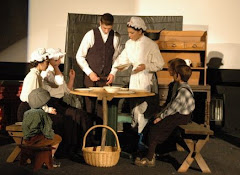
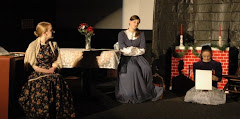
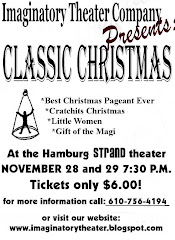


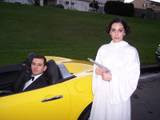
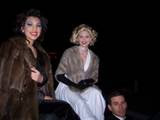
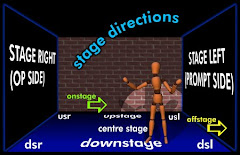
5 comments:
i only have one question...
...
...is there gonna be a quiz?
Only for you, Danika....
Wow! Reading that really made me excited!
A QUIZ!!!!!!! I hate correcting quizes so no, no, no quiz : o )
artchick...who are you in the play? Welcome to the blog.
It's me, Martha :-)
Post a Comment